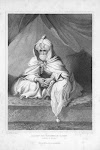 |
| Getty Images |
He was a descendant of the early Fulani settlers in Hausaland in the 15th century. He spent his youth in the devout pursuit of Islamic religious education, and his early manhood preaching, teaching and writing.
Dan Fodio became an itinerant Muslim preacher in 1774, moving among rural communities.
He was a leader in the expansion of Islam across the Hausa countryside, increasing the popular basis for religious teaching and bringing literacy to numerous small communities.
Dan Fodio wrote poems and stories of mysticism that increased his popularity as a teacher and preacher.
Throughout his proselytizing dan Fodio told of being given the “Sword of Truth” to advance Islamic law and defeat the enemies of Allah. His "sword" was the written and oral word through prose and verse.
Usman found, however, that Hausa rulers, following common Hausa practice, had mixed “pagan” practices with Islamic ones and did not adhere closely to Islam. He began to criticize these rulers.
 |
| Former President Olusegun Obasanjo with Late Sultan of Sokoto Muhammadu Maccido Photo: Getty Image |
In 1804, Yunfa dan Nafata, the military commander of Gobir, sent his army to challenge Usman’s community which now included Fulani pastoralists who had their own grievances against Hausa rulers over a cattle tax.
Sources:
Nehemia Levtzion and Randall L. Pouwels, eds., The History of Islam in Africa (Athens: Ohio University Press, 2000); Kevin Shillington, Encyclopedia of African History (New York: Fitzroy Dearborn, 2004).
Nehemia Levtzion and Randall L. Pouwels, eds., The History of Islam in Africa (Athens: Ohio University Press, 2000); Kevin Shillington, Encyclopedia of African History (New York: Fitzroy Dearborn, 2004).
Contributor
Quintana, Maria L
University of Washington, Seattle
Stay turn for his Jihad Tomorrow
Quintana, Maria L
University of Washington, Seattle
Stay turn for his Jihad Tomorrow








0 Comments